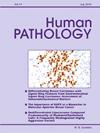无痛性克隆淋巴样疾病。
IF 2.7
2区 医学
Q2 PATHOLOGY
引用次数: 0
摘要
惰性克隆淋巴样疾病不被认为是淋巴瘤,因为它们通常不需要全身治疗,并且根据病变情况,只需要有限的临床随访。这些病变通常是在检查其他疾病时偶然发现的。对无性克隆淋巴疾病的认识对于避免误诊为淋巴瘤和不必要的治疗具有重要意义。尽管如此,一些惰性疾病,特别是b细胞疾病,可能会导致与疾病负担无关的重要发病率,但与可能需要治疗的自身免疫性疾病有关。此外,其中一些病变可能以不同的速率最终进展为淋巴瘤。因此,惰性克隆性淋巴疾病也提供了对克隆性淋巴疾病的早期阶段的见解,这可能会增加我们对淋巴瘤的理解,尽管还有很多需要阐明。本文综述了B细胞和t细胞无性克隆淋巴样疾病。本综述未包括可能被误认为淋巴瘤但非克隆性的淋巴样病变,如惰性t淋巴细胞增殖或伴免疫球蛋白轻链限制的边缘带增生。此外,强调已给予克隆性淋巴病变,因此惰性浆细胞病变未包括在内。也排除了惰性淋巴瘤可能不需要治疗,但仍然需要更多的定期随访。人们可能有理由认为,在构成无痛性克隆淋巴样疾病和无痛性淋巴瘤之间可能存在灰色地带。这一讨论反映在不同版本的世卫组织分类以及世卫组织分类第五版与国际共识分类之间对某些实体使用的不同术语上。前者已被用作本次审查的选择依据,但在国际商会命名法不同的情况下,也参照了早先修订的世卫组织分类第四版(WHO-r4)。因此,胃肠道无痛性t细胞淋巴瘤(ICC:胃肠道无痛性克隆t细胞淋巴增生性疾病)未包括在本综述中。本文章由计算机程序翻译,如有差异,请以英文原文为准。
Indolent clonal lymphoid disorders
Indolent clonal lymphoid disorders are not recognized as lymphomas as they generally need no systemic treatment, and depending on the lesion, need only limited clinical follow-up. These lesions are usually incidentally diagnosed during the work up for other disease. The recognition of indolent clonal lymphoid disorders is important to avoid misdiagnosis as lymphoma and unnecessary treatment. Notwithstanding, some indolent disorders, especially B-cell disorders, may give important morbidity that is not related to disease burden but related to auto-immune disease which may need treatment. Further, some of these lesions may, at various rates, ultimately progress to lymphoma. As such, the indolent clonal lymphoid disorders also give an insight into the earliest stages of clonal lymphoid disease that may increase our understanding of lymphoma, although much needs yet to be elucidated. In this article both B- and T-cell indolent clonal lymphoid disorders are reviewed. Not included in this review are lymphoid lesions that may be mistaken for lymphoma, but are not clonal, such as indolent T-lymphoblastic proliferation or marginal zone hyperplasia with immunoglobulin light chain restriction. Further, an emphasis has been given to clonal lymphoid lesions and therefore indolent plasma cell lesions have not been included. Also excluded is indolent lymphoma that may not need treatment but nonetheless requires more regular follow up. One may rightfully argue that there may be a gray zone between what constitutes an indolent clonal lymphoid disorder and an indolent lymphoma. This discussion is reflected in the different terminology used for some entities between editions of the WHO classification and between the Fifth Edition of the WHO Classification and the International Consensus Classification (ICC). The former has been used as a selection basis for this review, but cross-reference has been made to the ICC nomenclature when that differs as well as to the earlier Revised Fourth Edition of the WHO Classification (WHO-r4). For this reason, indolent T-cell lymphoma of the gastrointestinal tract (ICC: indolent clonal T-cell lymphoproliferative disorder of the gastrointestinal tract) is not included in this review.
求助全文
通过发布文献求助,成功后即可免费获取论文全文。
去求助
来源期刊

Human pathology
医学-病理学
CiteScore
5.30
自引率
6.10%
发文量
206
审稿时长
21 days
期刊介绍:
Human Pathology is designed to bring information of clinicopathologic significance to human disease to the laboratory and clinical physician. It presents information drawn from morphologic and clinical laboratory studies with direct relevance to the understanding of human diseases. Papers published concern morphologic and clinicopathologic observations, reviews of diseases, analyses of problems in pathology, significant collections of case material and advances in concepts or techniques of value in the analysis and diagnosis of disease. Theoretical and experimental pathology and molecular biology pertinent to human disease are included. This critical journal is well illustrated with exceptional reproductions of photomicrographs and microscopic anatomy.
 求助内容:
求助内容: 应助结果提醒方式:
应助结果提醒方式:


